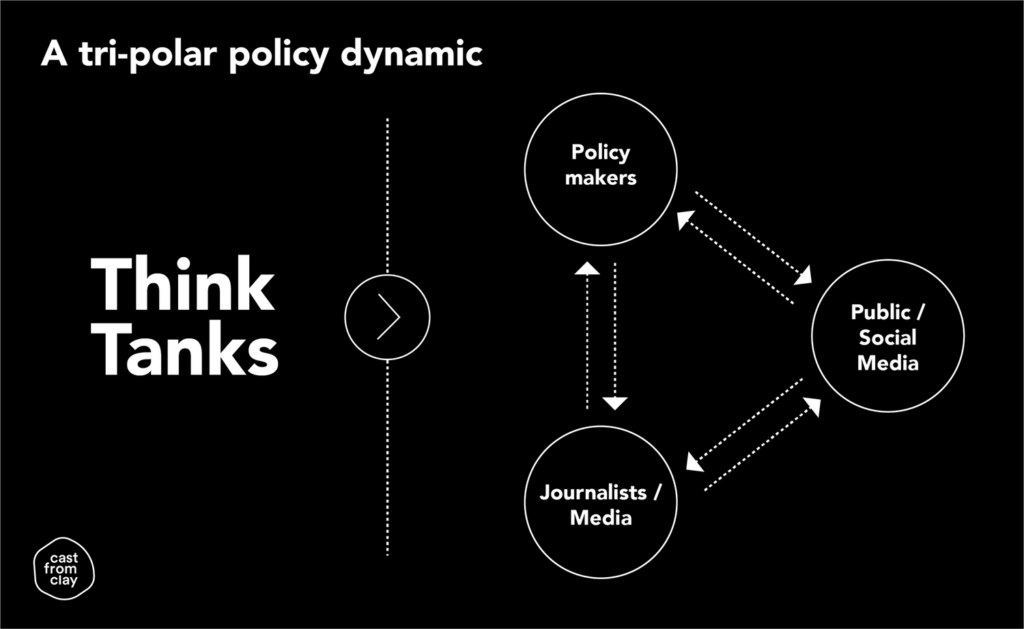
It’s barbecue season in the UK, meaning think tankers get to experience the unique joy of watching people question their career choice through a mouth full of coleslaw:
“Think tank?”
“One of those lobbying organisations?”
“Those people that get quoted in newspapers and stuff?”
“Who funds you?”
Sound familiar?
Maybe you only socialise with fellow wonks so don’t have this issue. Or maybe this doesn’t concern you because you feel a family get together doesn’t represent the general public’s perception of think tanks.
Well, I come bearing bad news. At Cast From Clay, we polled the public and found that…
The public don’t know what a think tank is
Only one in two Americans know what a think tank is. It’s a similar picture in the UK.
Those who say they know what think tanks are are wary of what they do
Of the Americans who said they do know what a think tank is, 34% said think they are ‘manipulative’ and 28% said they do backroom deals.
You’ll see this mixed picture when you talk to people in the street, like we did in Pittsburgh, Pennsylvania.
Many people didn’t know what a think tank was. Those who did, didn’t have the most positive associations.
Why does it matter what these people think? Ignore it. Just like the barbecue questions. You’ve got months before the holidays and the next round of questions from people you don’t think you need to explain yourself to, right?
Trouble is…
Nowadays, think tanks can’t afford not to have a relationship with the public.
We can’t just shrug and say ‘they’re not our target audience’.
Set aside the moral argument for including people in shaping those policies that will affect their lives. We can’t escape the current political reality: social media means the public are now a key player in political discourse. Politicians are more likely to support ideas that already have public support. It’s an easier way for them to build and maintain their own popularity.

Another thing our research highlights is that the public expects accountability from those organisations that claim to work in their interest. And like their corporate and charitable counterparts, think tanks require a license to operate. Ask Uber, ask Oxfam, ask Facebook what else they lost when they lost the public’s trust. (Spoiler alert: loads of money).
Public engagement is an exciting opportunity
This is all sounding a bit doom and gloom. But there is a way forward, and that is to build a relationship with the public.
We’re excited about what this means for think tanks. Especially when you look at think tanks that are already doing this well. Like foraus. Their Policy Kitchen allows them to go beyond the usual suspects when researching policy. Hear them talk about it in this On Think Tanks webinar.
Sign up to our newsletter
Another example we like is the OECD’s use of Youtube influencers to raise awareness among young people in Greece of the issue of corruption. Partnerships like this help think tanks get around the issue of information origin – meaning, that it matters less what is being said than who is saying it.
One thing that stood out in our research was how many people listed ‘conversations with friends’ and ‘social media’ as their preferred way of engaging with politics. Influencers occupy an interesting middle-ground here. Someone you ‘see’ week by week, even day by day, will start to feel like a friend. If they speak about an important issue like corruption, you’re likely to listen.
How can we get to a place where think tanks are equipping people with informed ideas to take to their next barbeque politics chat, rather than tired tropes from Twitter?
Engaging with the public can simply be a case of making your research communications more human. Take the ODI’s ‘American Journey’ – a piece that looks at how migration has shaped the US. This is an example of a think tank recognising the importance of stories and emotion in getting people behind policy positioning. We’d love to see more of this.
Because there’s a real opportunity here. As our recent research muses “Rather than playing a paternalistic role of bestowing knowledge on the public, could think tanks have more of a role as convenors? Generating ideas, framing the debate, and then orchestrating an informed public dialogue?” We think so.
This piece was originally written for On Think Tanks.
Photo by DESIGNECOLOGIST on Unsplash





